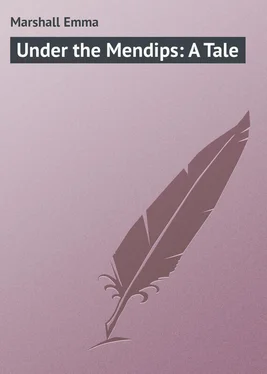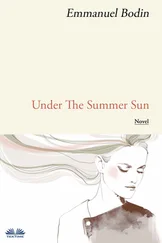Emma Marshall - Under the Mendips - A Tale
Здесь есть возможность читать онлайн «Emma Marshall - Under the Mendips - A Tale» — ознакомительный отрывок электронной книги совершенно бесплатно, а после прочтения отрывка купить полную версию. В некоторых случаях можно слушать аудио, скачать через торрент в формате fb2 и присутствует краткое содержание. Жанр: foreign_prose, на английском языке. Описание произведения, (предисловие) а так же отзывы посетителей доступны на портале библиотеки ЛибКат.
- Название:Under the Mendips: A Tale
- Автор:
- Жанр:
- Год:неизвестен
- ISBN:нет данных
- Рейтинг книги:5 / 5. Голосов: 1
-
Избранное:Добавить в избранное
- Отзывы:
-
Ваша оценка:
- 100
- 1
- 2
- 3
- 4
- 5
Under the Mendips: A Tale: краткое содержание, описание и аннотация
Предлагаем к чтению аннотацию, описание, краткое содержание или предисловие (зависит от того, что написал сам автор книги «Under the Mendips: A Tale»). Если вы не нашли необходимую информацию о книге — напишите в комментариях, мы постараемся отыскать её.
Under the Mendips: A Tale — читать онлайн ознакомительный отрывок
Ниже представлен текст книги, разбитый по страницам. Система сохранения места последней прочитанной страницы, позволяет с удобством читать онлайн бесплатно книгу «Under the Mendips: A Tale», без необходимости каждый раз заново искать на чём Вы остановились. Поставьте закладку, и сможете в любой момент перейти на страницу, на которой закончили чтение.
Интервал:
Закладка:
Joyce glanced at the large clock over the counter:
"Then, I think, we will go to the service, and if we are not too late – "
"Oh, yes," Charlotte said, eagerly. "Do let us go, and come back to the china-shop afterwards."
Charlotte had her own reasons for desiring to go to the cathedral. The hero of her silent worship was Mr. Bamfylde, a new minor Canon, and it was his week for doing the duty.
Joyce completed her purchases, and left orders for them to be sent to the Swan; and then, just as the last chime was ringing and the old clock struck three, the two girls passed up the nave to the choir.
The work of restoration had not been begun, and the beautiful proportions of the choir of Wells Cathedral, were disfigured by high seats and an ugly pulpit. But Joyce's eyes were not critical, and she gave herself up to the soothing and elevating influence of the place, without any very distinct idea of why it was soothing and elevating. The service was slovenly enough in those days, and the new minor Canon got through it as fast as he could. The choristers straggled in, with no regard to order, and the lay-vicars conversed freely with each other, now and then giving the head of the chorister nearest to them a sharp rap with the corner of an anthem-book, or their own knuckles, through the open desk. The boys' behaviour was a little better than that of the men, for they had a wholesome fear of being reported to the Dean and Chapter, and feeling the weight of the old Grammar School master's birch-rod.
When the service was half over there was a sound of feet and voice's in one of the side aisles, and the Dean, who was in his stall, looked sharply round. The verger hobbled out to see what his coadjutor outside the choir could be about, to allow such a disturbance. The verger was sound asleep, with his chin upon his capacious breast, and quite unconscious of the presence of the two young gentlemen who were chatting and laughing with each other, in the south transept.
The verger stumped after them, vainly endeavouring to rouse his heavy friend, and said:
"There's service going on; you mustn't make a disturbance, gentlemen; it's contrary to the Dean's wishes."
The elder of the two men answered with a laugh, but the younger said:
"Be quiet, Falconer. Don't you hear they are reading prayers?"
"Well, I am neither reading them nor saying them," was the answer. "I had enough of that at Pembroke. Now, old fellow, keep a civil tongue in your head, will you?" as the verger, angry at the contemptuous disregard of his commands, said:
"I'll turn you out, if you don't go peaceably."
Again another laugh; and the fat verger, who had now recovered from his heavy afternoon nap, came bearing down on the young men.
"You'll walk out this instant," he said, raising his staff of office. "I wonder you ain't ashamed of yourself."
"No, my good man; on the contrary, I am proud of myself."
"Proud! Yes, a popinjay like you is proud enough, I'll warrant," murmured the other verger.
"Can we get into the choir, Arundel?"
"We had better wait here," was the answer. "The service is nearly over. Come this way into the cloisters. Don't be aggressive, Falconer, and make a row."
"I hate rows as much as you do," was the answer; "but I am not inclined to knock under, to this pair of drivelling old idiots."
I cannot say how this unseemly wrangle might have ended had not the verger in charge of the Dean heard the blowing of the organ pipes, which was a warning that he was to hasten to perform his office, and conduct the Dean back to the Deanery.
Almost immediately the organ sounded, and those who had taken part in the service came out. Joyce and Charlotte were amongst the last of the very scanty congregation.
Melville, for reasons of his own, did not care to introduce his friend at that moment, and Mr. Arundel was quite unconscious that the fair face of which he caught sight, from under the shadow of the large bonnet, was that of Melville's sister.
"What a sweet face!" he thought; and then, as Joyce turned suddenly towards the spot by the font where the two gentlemen were standing, a bright blush and smile, made her look irresistibly lovely.
"Who is that young lady, Melville? She knows you." For Joyce had made a step forward, and then apparently changed her mind and went towards the north door with Charlotte.
Melville fingered his cravat, and settled his chin in its place above it. "That little girl dressed as if she came out of Noah's ark is my sister! Come, you will have another opportunity of cultivating her acquaintance, and you want to call at the Palace, don't you?"
"My mother charged me to do so; but there is no haste."
"Oh, you had better not lose time, or you may not find your legs under the Bishop's mahogany. We live some miles out, you know."
Mr. Arundel turned his head round twice to take a last look at the retreating figures, and then allowed Melville to tuck his arm in his, and walk down the cloisters with him to the Palace.
Melville was in fact very anxious to show off his intimacy with Mr. Arundel to the bishop, for he could not hide from himself the fact that the ecclesiastical élite of Wells had not paid him the attention he hoped to receive. The truth was that rumours of Melville's gay and careless life, and the anxiety he had given his father, had reached the ears of some in authority. Heads of colleges reported his behaviour at Oxford, and Melville had been sent down, not for what may be called serious offences; but still the character hung about him of a man who cared for nothing earnestly; reading or rowing, it was all alike. Nothing that Melville did was done with singleness of purpose, except, as his father sometimes said, with a sigh, "dress himself like a mountebank and copy London fashions."
CHAPTER III.
THE PALACE
The old baronial Palace of Wells, surrounded by its moat and reached by a drawbridge – not raised now as in olden times, – is in perfect harmony with the city in which it stands. In it, but not of it; for when once the gateway is passed, the near neighbourhood of the market-place is forgotten, such traffic as this little city knows is left behind; and the gardens of the Palace might well be supposed to be far from all human habitations, so complete is the repose which broods over it. Encircled by battlemented walls, and standing in a wide demesne, a stranger is at once struck with the unusual beauty of its surroundings.
Mr. Arundel's admiration rather disconcerted his friend.
"Come on, Arundel. Don't stare about like that; some of the family may be at the windows."
But Mr. Arundel did not heed his friend's entreaty.
"Come on; it is so like a country clodhopper to stand looking at a big house, as if you had never seen one before."
"I never have seen one before, in the least like this big house," was the reply; "and what are those ruins? It is odd, Falconer, that you never prepared me for the beautiful things I was to find in Somersetshire."
"It's a mighty damp place," Melville said. "Rheumatism and low fever haunt the servants' quarters, which are on a level with the moat; but, my dear fellow, do come on."
"Can't we cross over to that old wall? It is like a glimpse of Paradise through there."
"No, no, we must go up to the front like well-mannered folk. Come, don't be so obstinate, Arundel."
Whether Melville would have succeeded in his attempts to draw his friend towards the entrance-porch, which stood in the centre of a long line of windows of the lower story of this side of the Palace, I do not know, had not a clerical figure in knee-breeches and shovel hat, been seen advancing over the emerald turf, and approaching the two young men.
Melville began to show signs of nervousness, and the grand air which he maintained to his inferiors gave place to a rather servile and cringing manner, as he carefully removed his high narrow hat from his curled head and, bowing low, said:
Читать дальшеИнтервал:
Закладка:
Похожие книги на «Under the Mendips: A Tale»
Представляем Вашему вниманию похожие книги на «Under the Mendips: A Tale» списком для выбора. Мы отобрали схожую по названию и смыслу литературу в надежде предоставить читателям больше вариантов отыскать новые, интересные, ещё непрочитанные произведения.
Обсуждение, отзывы о книге «Under the Mendips: A Tale» и просто собственные мнения читателей. Оставьте ваши комментарии, напишите, что Вы думаете о произведении, его смысле или главных героях. Укажите что конкретно понравилось, а что нет, и почему Вы так считаете.












